March 14, 2025 – Day 26 of the 100-Day Dharma Talk Day , Buddha’s Nirvana Day, Friday Dharma Q&A
Hello. Today is the 26th day of Venerable Pomnyun Sunim’s 100-Day Dharma Talk series and Buddha’s Nirvana Day, commemorating the day when Buddha entered nirvana.
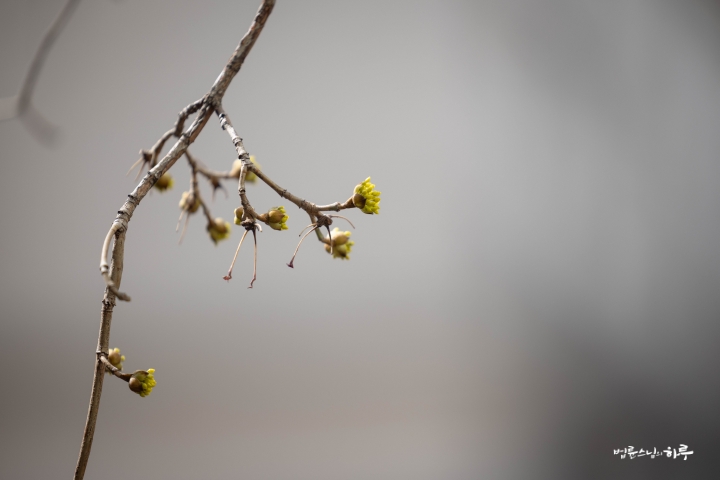
After completing his morning practice and meditation, Sunim headed to the Jungto Social and Cultural Center to conduct a special Dharma ceremony commemorating Buddha’s Nirvana Day.
After diligently performing the 10 a.m. Buddhist service, Sunim began the special Dharma ceremony for Buddha’s Nirvana Day at 10:15 a.m. About 150 people gathered in the Dharma hall on the third floor of the Jungto Social and Cultural Center. After reciting the Three Refuges and the Heart Sutra, they requested Sunim’s Dharma talk with three full bows.
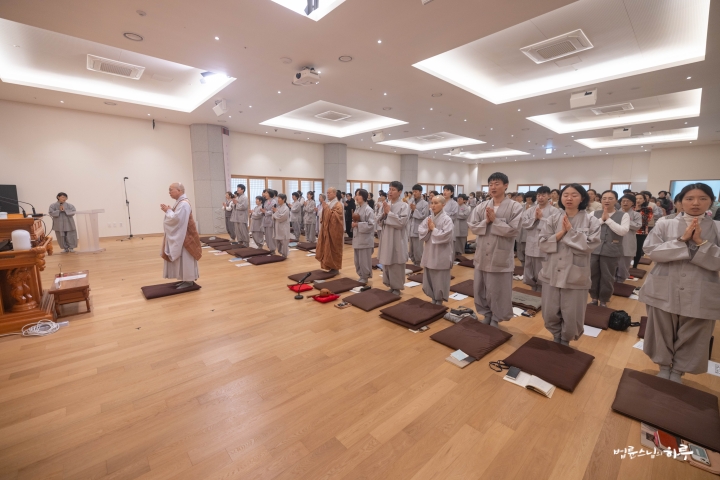
Sunim described in detail what Buddha’s final moments were like, painting a vivid picture as if showing a scene from a movie.
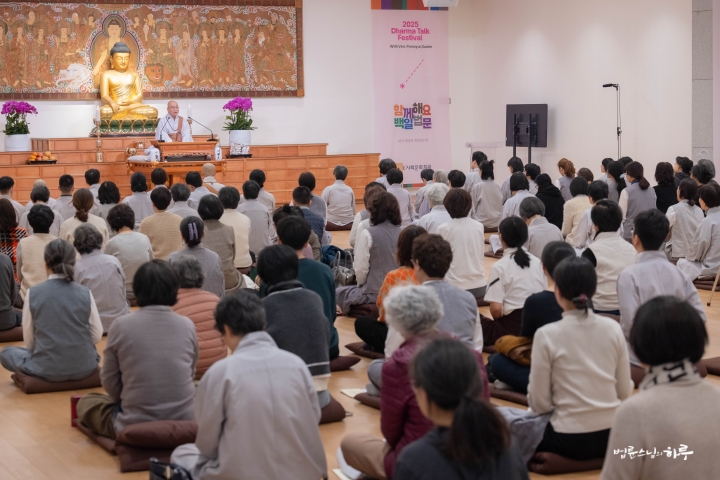
“Today is the day Buddha entered nirvana. Nirvana Day, in secular terms, means the day of his passing. We can say it’s the day Buddha abandoned his physical body. Buddha’s footsteps of teaching continued without rest for 45 years. At the age of 80, 51 years after leaving home, and 45 years after attaining enlightenment, Buddha quietly entered nirvana in the Sala tree grove in Kushinagar. The Buddhist calendar begins from the day Buddha entered nirvana. This year is Buddhist year 2569, so from today, Buddhist year 2569 begins.
What was Buddha like when he was passing away?
It is said that Buddha experienced no change in his mind at the moment of his passing. It was like how we feel no significant change in our minds when we fall asleep at night and wake up in the morning. Some people with mental health issues tremble in the evening because they have nightmares whenever they close their eyes. Most people fear death and show similar reactions when their time comes. However, Buddha entered nirvana just as naturally as someone who goes to sleep at bedtime and wakes up in the morning, while having ordinary conversations. There was no difference from his usual demeanor.
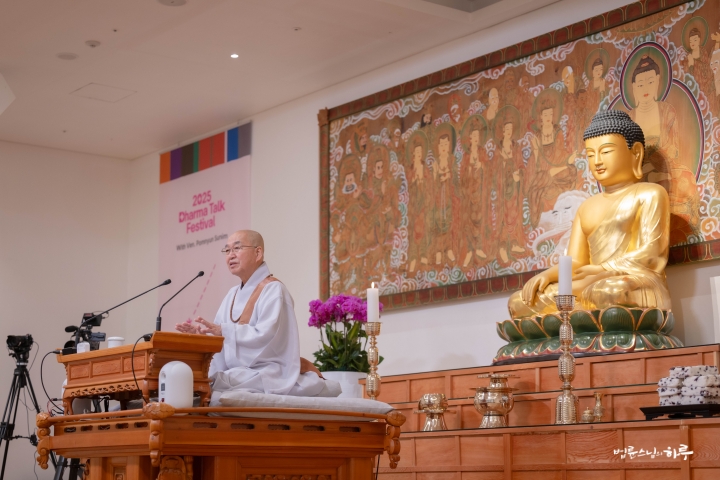
What were Buddha’s final words before entering nirvana? In other words, what was his last will? You shouldn’t understand this as leaving behind instructions for future generations, as people generally do with their wills. Being a person without any anguish, he wouldn’t have worried about the future. So Buddha didn’t leave instructions about what to do after his death. He simply answered people’s questions. A notable question came from Ananda, who anxiously asked, ‘Who should become the leader of the order after you pass away?’ Buddha replied, ‘That is unnecessary.’ Earlier, when Devadatta had declared that he would be the successor, Buddha also said it was unnecessary. His message was that since each member of the Sangha is a practitioner, there is no need for someone to replace Buddha. This is why the tradition developed in the Sangha where all community members are owners, and decisions are made by unanimous consent.
If you look at other religions, they have concepts like the second leader or third leader. But Buddhism doesn’t have such concepts. Buddha always said, ‘I have no secrets held in my hand.’ He revealed everything transparently. So there’s no story of him quietly giving some secret transmission to someone. Just as there are rumors about ‘who has been appointed’ when a royal throne is succeeded, in religions there have always been instances where a teacher leaves a secret transmission to a successor, which serves as a token for the successor to continue the next generation. However, in Buddha’s case, the statement ‘I have no secrets held in my hand’ appears several times in the scriptures. Since Buddhism is composed of individuals who have left home, practiced, and achieved a certain level of self-completion, there is no need for someone to control or manage it. That’s why Buddhism doesn’t have concepts like the first leader, second leader, or third leader. However, in Seon Buddhism, there is a concept of inheriting the true Dharma from successive patriarchs.
Ananda continues to ask questions. When he asks, ‘Practitioners always think of you, but who should they think of when you are gone?’ Buddha answers, ‘Think of the Four Noble Truths.’ When asked, ‘What should we rely on when you are not here?’ Buddha replies, ‘Rely on my teachings and precepts.’ Looking at Ananda’s questions, it seems clear that Ananda was lacking in enlightenment. In any case, according to tradition, Ananda had not yet become an Arhat but later joined after practicing with fearless determination for a week before the compilation of the scriptures. Looking at these questions, such stories seem plausible. However, thanks to Ananda’s questions, we can hear good Dharma teachings.
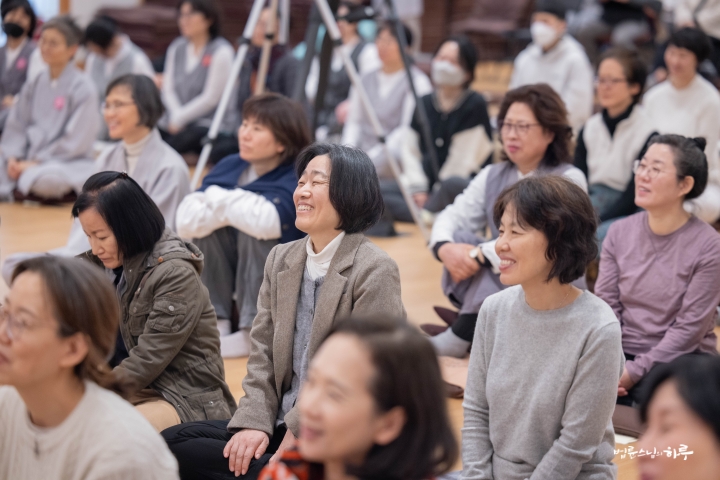
When Ananda asked, “In a world without the Buddha, to whom should we make offerings to gain great merit?” the Buddha replied as follows:
“Do not worry. Giving food to the hungry, medicine to the sick, helping the poor, comforting the lonely, and supporting those who practice with purity—these acts have the same merit as making offerings to the Tathagata.”
Ananda asked several questions like this, and the Buddha answered them. We refer to these as the Buddha’s final teachings.
Before passing away, the Buddha invited everyone to ask any final questions, saying they should ask while he was still alive rather than regret not asking after he entered nirvana. Three times he said, “If you have questions, ask them now.” He even added, “Ask comfortably, as a friend would ask a friend,” to put them at ease. When no one spoke, Venerable Ananda said:
“The Buddha has already taught us all the Dharma regarding matters that might cause us doubt. We have no questions. All that remains is for us to practice what you have taught.”
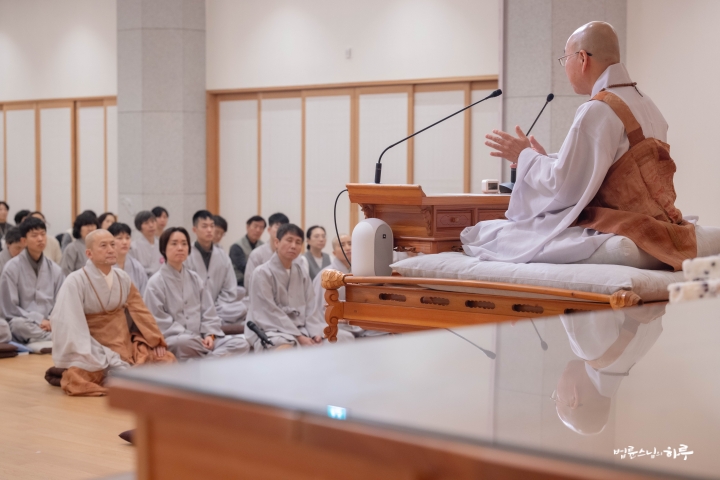
Sunim explained that it’s not about having more to learn, but rather that we haven’t fully practiced what we already know. Then the Buddha left his final words.
“All things are impermanent. Strive diligently. Like drops of water penetrating a rock.”
After speaking these words, the Buddha entered nirvana. The word ‘impermanent’ doesn’t mean nihilistic. It’s a translation of ‘anicca (無常)’. It means nothing is eternal. Since nothing is eternal, there is nothing worth clinging to. We often misinterpret impermanence as nihilism. Nihilism is a negative mindset. It is suffering. The Buddha didn’t mean the world is meaningless, but rather that since the world is impermanent, we should practice diligently. This was the Buddha’s demeanor as he entered nirvana.
New Movements That Sought to Return to the Buddha’s Original Teachings
With the passage of time, the original purpose of any movement gradually becomes obscured. Considering this reality, we must deduce what the Buddha’s original teachings were. Buddhism originally taught practice, with no evidence of religious activities seeking blessings. At its beginning, it taught practice, but over time, religious activities formed. We can describe this as either development or corruption. That’s why I’ve named it the “History of Buddhist Transformation” rather than “History of Buddhist Development,” which is a more neutral term.
Throughout Buddhist history, there have been several movements calling for a return to the Buddha’s original teachings. Five hundred years after the Buddha’s nirvana, the Mahayana Buddhist movement emerged. In Mahayana Buddhism, it is believed that the Buddha had foreseen the need for a new Buddhist movement. So they claimed:
“The Buddha secretly taught sutras and hid them in anticipation of the decline of the Dharma 500 years after his nirvana and the rise of a new Buddhism. This is that sutra.”
In this way, they brought out Mahayana sutras from somewhere and initiated a new movement. They did this to gain legitimacy from the existing order. The Buddha said there were no hidden secrets, but from this point on, hidden secrets came into existence. (Laughter) In any case, the Mahayana Buddhist movement was about returning to practice, the Buddha’s original teaching.
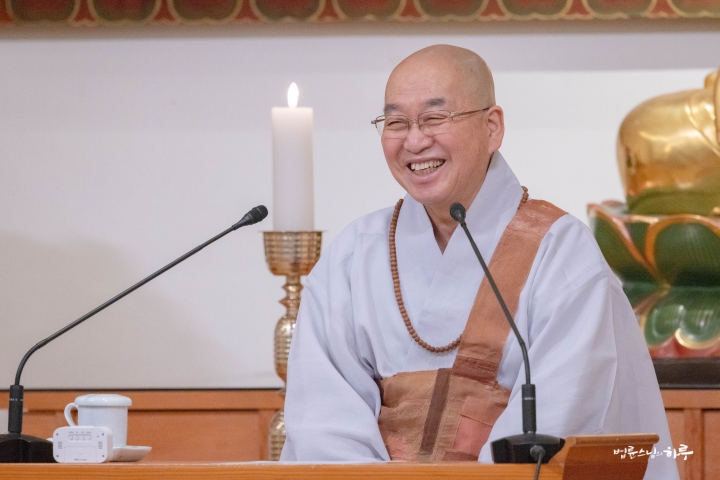
As Buddhism spread to China, temple construction and scholarly pursuits became central. As more people gathered, larger temples were built and more sutras were translated, leading to the training of many monks. This focus on external forms created a greater need for donations, which inevitably led to practices of praying for blessings. Almost no one donates money without expecting blessings in return. Perhaps Jungto Society is the only place where people donate without expecting blessings. (Laughter)
Later, a movement emerged to return to the Buddha’s original teachings. This was Seon Buddhism in China.
“The Buddha is not in heaven or in statues, but within my own mind. When my mind is ignorant, I am an ordinary being. When my mind is awakened, I am a Buddha.”
When these ideas were first proclaimed, the Seon movement was treated as heretical and faced severe persecution. However, as time passed and it gained public support, it too began building large temples and engaging in sectarian competition. This cycle of rise and fall is the nature of history and human society. It is difficult to maintain the original form. What’s important is for those who initiated new movements to strictly adhere to the principles of practice, extending what might last 50 years to 100 years, or what might last 100 years to 200 years.
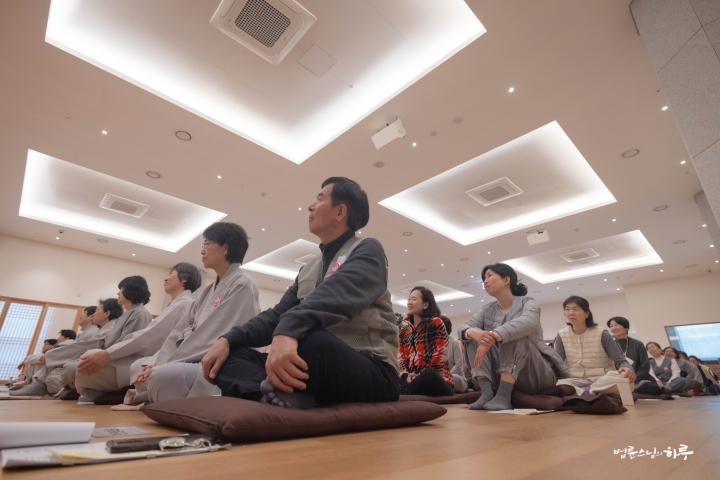
How to Ensure the Buddha’s True Teachings Are Transmitted for a Long Time
It took 200 years after the Buddha’s parinirvana for divisions to emerge within the Sangha. Since the Buddha lived in open spaces and ate and lived exactly like the general public, all practitioners could learn directly from the Buddha’s way of life. Therefore, even after the Buddha passed away, there were no major differences of opinion among practitioners. The disciples observed the Buddha’s example and followed it, and this was transmitted to later generations for some time, allowing the true Dharma to be maintained relatively longer.
However, nowadays, even new movements split apart in their own time. The popularization of Buddhism has both positive and negative aspects. To become popular, one must cater to public demands, which gradually blurs the principles of practice. Conversely, if one adheres too strictly to practice principles, no one comes to the temple. This phenomenon is already occurring in Korean temples. Since no one comes to the meditation hall if everything is done according to strict principles, temples have had to accommodate certain requests. They must provide private rooms when asked and be mindful of beginners’ feelings. As a result, the concept of communal living is disappearing from most temples. For example, if someone refuses to wear proper Dharma robes during ceremonies, temples have no choice but to say, “Wear whatever you want.” Otherwise, everyone would leave.
Despite these realities, we must remember how the Buddha lived and strive to live as purely as possible. Sometimes exceptions must be made out of necessity, but as these pass to the next generation, they become precedents, with people saying, “That’s how it was done before,” gradually blurring the precepts and principles. While emphasizing principles too strongly may make them difficult to apply in reality, allowing some flexibility is necessary. However, we must always remember that this flexibility can easily become disorder in the next stage. If we emphasize only principles, it becomes too restrictive, but if we open things up a little, desires grow endlessly. This is why the Middle Way(中道) is necessary.
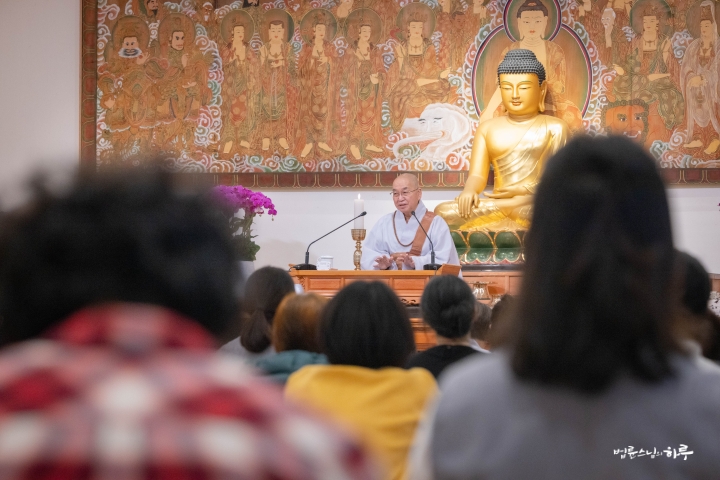
After the Buddha’s passing, a controversy arose 100 years later about whether practitioners could store salt. When I was young and studying Buddhist history, I wondered, “Did practitioners really argue so much over something as simple as salt?” But it’s actually not a simple matter. The debate about storing salt led to a debate about whether monks could accept money. Among the ten controversies, the salt issue was the first, and the money issue was the tenth. So it wasn’t a trivial matter at all.
Today, on the anniversary of the Buddha’s passing into nirvana, I hope we can reflect on the concerns that gave rise to Mahayana Buddhism and Seon Buddhism, and consider how we should maintain our practice-oriented perspective. Even if we cannot completely restore the Buddha’s original teachings, we should not give up but continue to strive toward them. Even while acknowledging our shortcomings, we should live with our aim directed toward liberation and nirvana. We shouldn’t give up by saying, “That’s just how reality is.” We need to embrace some aspects of our changed reality while preserving the fundamentals. If we accept changes without maintaining the fundamentals, we’ll quickly revert to the real society. In this regard, I hope that today, as we observe the day of the Buddha’s passing, we will engrave in our hearts the expression from the Diamond Sutra that the Buddha was always concerned for future practitioners, and continue our diligent practice.”
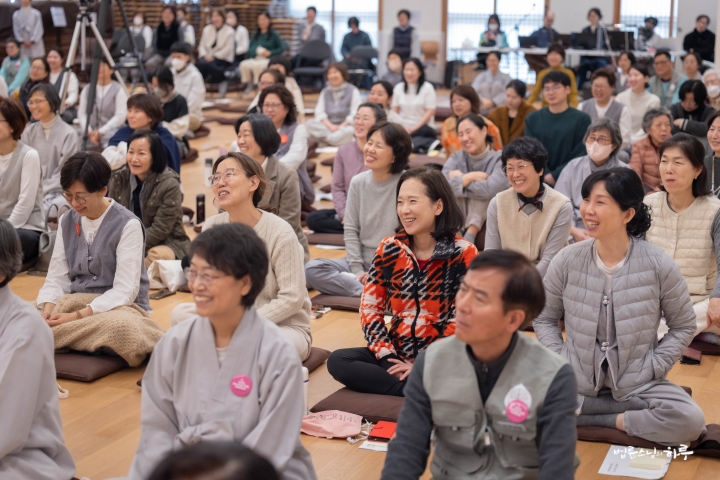
Continuing from the previous day, Sunim reflected on the past eight days of practice and made a commitment to diligently practice throughout the year, bowing one bow after another.
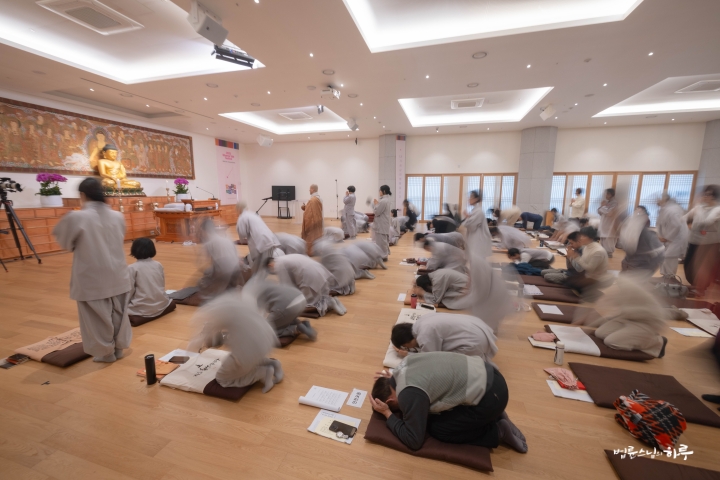
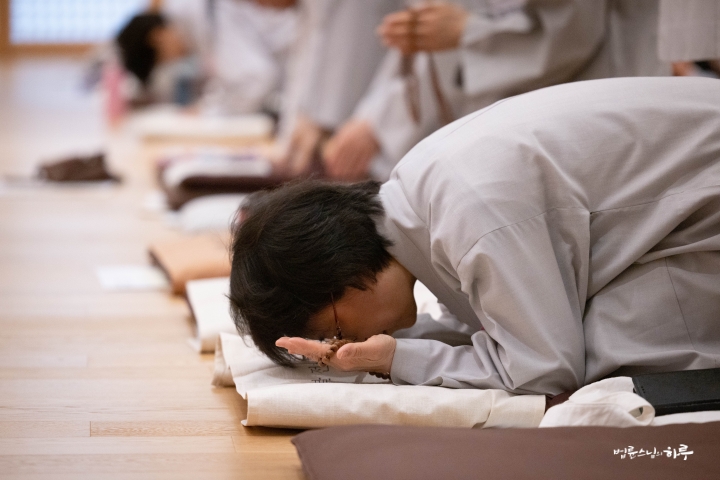
After completing 300 bows, participants gathered in groups to share their thoughts and feelings. Finally, to conclude the special Dharma assembly commemorating Buddha’s Nirvana Day, a memorial service was held to express gratitude to the ancestors who made our existence possible.
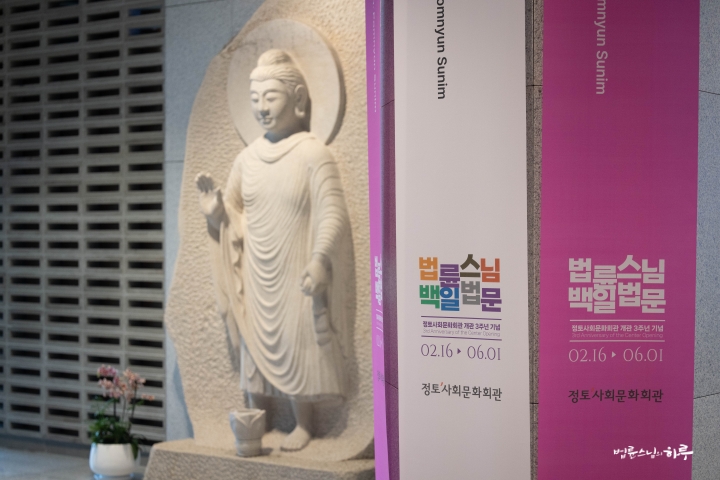
Sunim left the Dharma hall on the third floor and had lunch with the Sangha members in the dining hall on the basement level. After finishing the meal, he spent the afternoon working in his office.
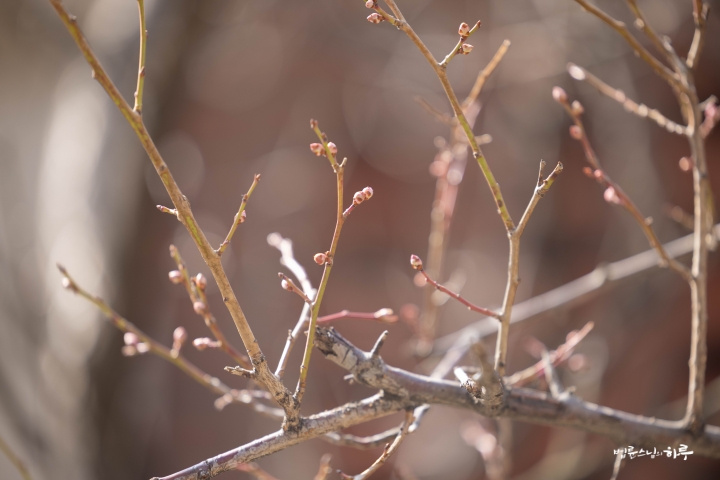
As the sun set, at 7:30 PM, Sunim conducted the Friday Dharma Q&A session in the main hall in the basement. Many citizens came to the Jungto Social and Cultural Center to attend the Q&A. They registered at the reception desk or submitted their questions before heading to the basement hall with light steps.
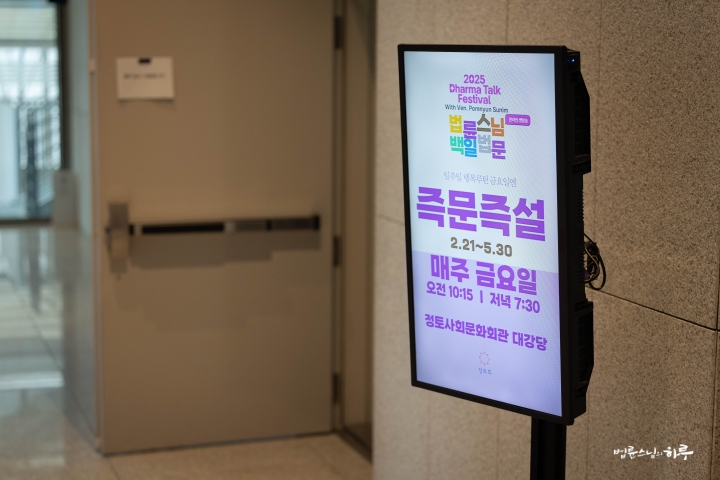
The session began with approximately 4,300 people watching online via YouTube and about 80 people attending in person. After reciting the Three Refuges and Words for Practice, Sunim took his seat on the stage.
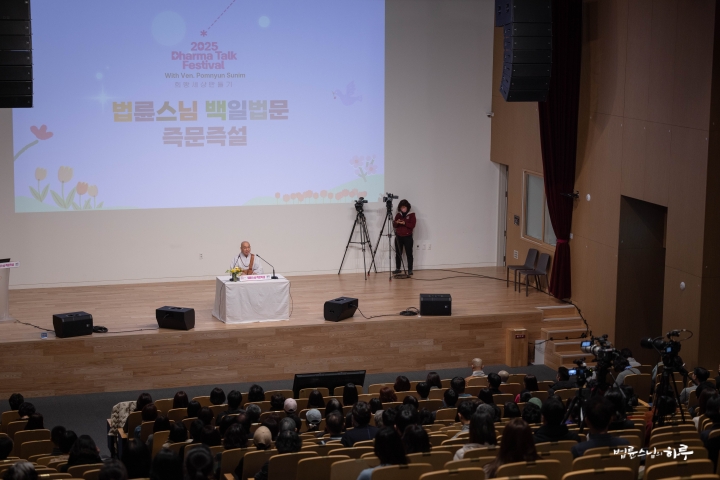
Sunim briefly introduced the purpose of the Dharma Q&A before immediately taking questions from the audience. During the hour and a half session, six people raised their hands to ask questions. One person sought Sunim’s advice, expressing doubt about why one should feel grateful to parents when they had many negative memories from their upbringing.
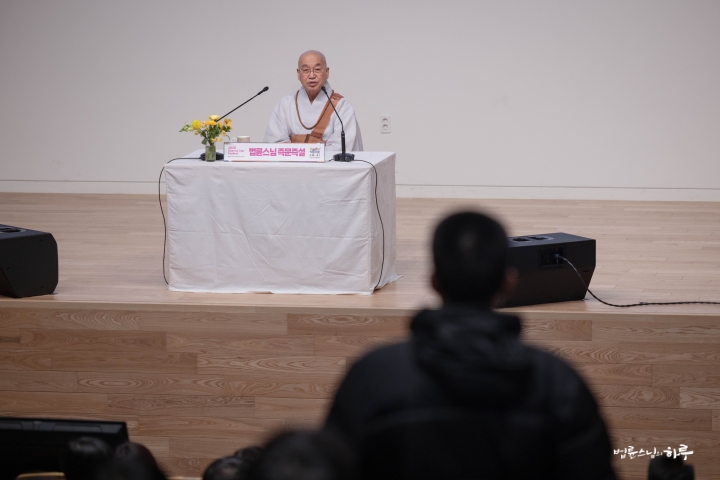
Why Should I Feel Grateful to My Parents?
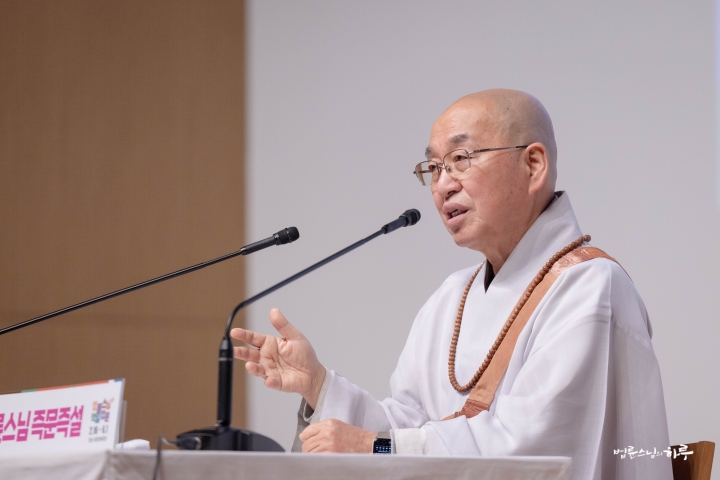
“You don’t have to feel grateful. What’s important is not to hate them. There’s no need to feel grateful. Just don’t hate them. If we look at the facts, just as we don’t hate strangers on the street, there’s no reason to hate our parents. If we calculate the parent-child relationship objectively, children receive more from their parents. Unless parents are elderly and dependent on their children, in most cases, parents give more to their children.
Even if your parents scolded you, it might have been due to their personality. If your parents divorced, that’s an issue children cannot intervene in. However, these things can cause deep wounds during childhood. What might be ordinary matters for adults can leave lasting scars on children. That’s why I say parents should be careful when raising children. That doesn’t mean your parents deliberately tried to make your life difficult. It’s highly likely that they did their best at their own level. So while it’s true that you were hurt during childhood, now as an adult, it’s necessary to accept that ‘this could have happened.’ You were hurt more deeply because you were young. If you were in the same situation as an adult now, you probably wouldn’t be hurt as much.
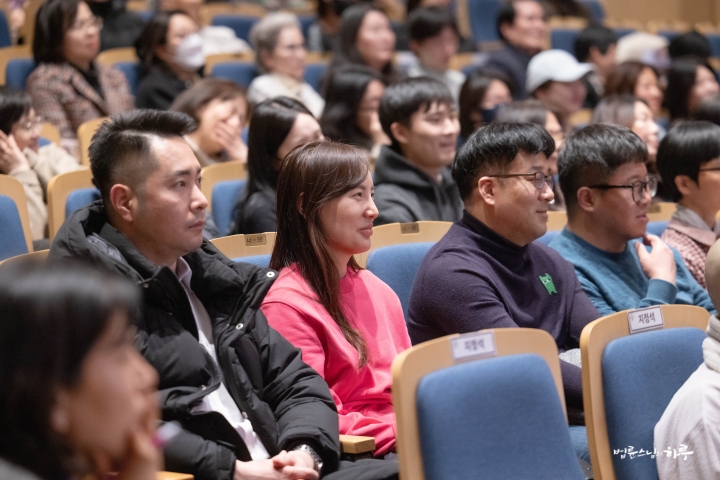
What is the most effective way to eliminate feelings of hatred? It is to have a grateful heart. This doesn’t mean you must force yourself to be grateful. Rather, developing gratitude is the most active and quickest way to eliminate hatred. When you feel grateful to your parents for giving birth to you and raising you, the feelings of hatred disappear. Of course, you might think, ‘My parents had me because they wanted to, and they raised me because they wanted to, not for my sake.’ But if you want to eliminate your feelings of hatred now, the fastest and most effective method is to develop a grateful heart.
Even from a logical perspective, children receive more from their parents than they give. Let’s say I’m wandering the streets, having to beg for food at other people’s homes and sleep under eaves. Someone provides me with shelter and food but scolds me daily and occasionally hits me. The question becomes: which situation is better? I would think it’s better to endure a slap if it means getting a meal. Similarly, dissatisfaction arises when you don’t consider the benefits you’ve received from your parents and only think, ‘As my parents, they should treat me well.’ It’s true that your parents may not have done everything you wanted. But objectively speaking, compared to strangers on the street, your parents have still provided you with benefits. So there’s no need to hate them.
The quickest way to eliminate feelings of hatred is to develop a grateful heart. When you cultivate gratitude, hatred disappears without a trace. Hatred remains only because there is no gratitude. You don’t have to be grateful, but it’s more important not to hate.”
“I understand well. Then is it okay if I don’t contact my parents from now on and continue to live with our relationship cut off?”
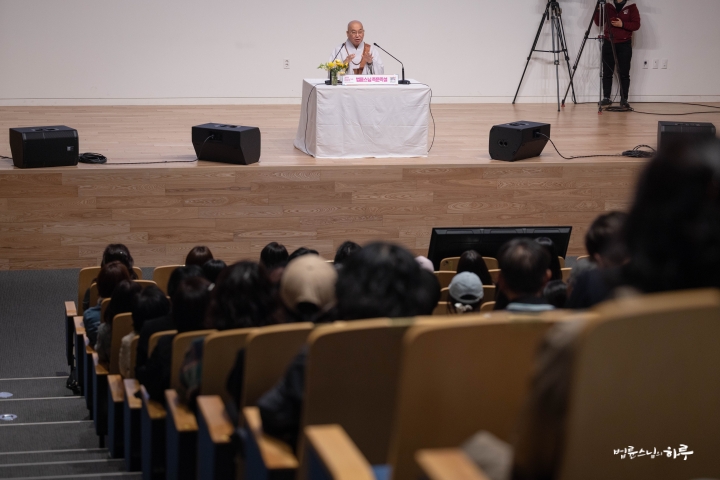
“Yes. There’s no problem with that. In nature, when birds leave the nest, it’s natural for them to live separately from their parents. If you want to contact them, you can, and if you don’t want to, you don’t have to. That’s not a problem at all. If your parents suffer because they miss you, that’s their issue, not yours.
However, if you feel guilty about not contacting your parents, then you might need to reach out to them to alleviate that guilt. You’re not contacting them for their sake, but to free yourself from suffering. If you can receive the news of your parents’ passing someday as if they were strangers, then you don’t need to contact them. But if you think you might regret not having reached out at least once, then you should contact them now to prevent that regret. Ultimately, you should examine what is beneficial for you and decide accordingly.
To avoid future regret, it might be helpful to keep it open about getting in touch. I’m not saying you should be good to your parents, but simply keeping the possibility of contact open might reduce future regret. However, if keeping that option open might create unnecessary stress or conflict, there’s no need to do so. But if you’re not contacting your parents because you hate them, you should consider whether that hatred stems from your own wounds. If those wounds are your issue, then ultimately, you need to resolve them yourself. Once your wounds heal, you might be able to live with the option of contact open.
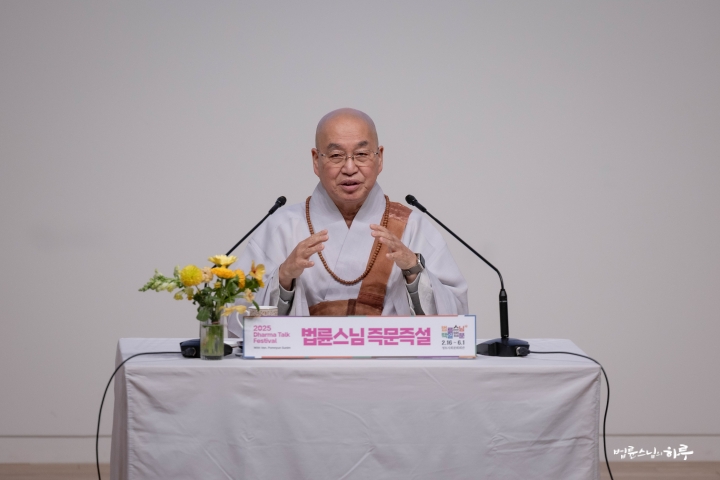
I always keep communication open with my family, but I rarely have occasions to meet them. Because I’m so busy, contact naturally becomes less frequent. It’s the same with friends and people around me. There’s no need to deliberately cut off relationships or block contact. Unless someone is stalking you obsessively, there’s really no reason to block them. You can easily make a decision by checking with yourself whether you might regret blocking contact later.
Family relationships remain in our unconscious mind, so even if your parents hurt you, affection for them may still remain within you. While memories of being scolded by your parents when you were young might remain as wounds, memories of them nursing you, feeding you, and raising you also remain in your unconscious. That’s why when you see your parents, memories of being hurt might come up first, but once you’re separated from them, you might feel a sense of longing. This is why some people have many regrets after their parents pass away. The saying “The unfilial child weeps” exists for a reason. While your parents were alive, you might have hated seeing them, but once they’re gone, regret often comes flooding in.
However, this doesn’t mean you have an obligation to maintain contact with your parents. What your parents did for you before you turned 18 is not a debt. This is because parents have an obligation to raise the children they bring into the world. So the help you received from your parents during childhood is not a debt. If you received help after that age, it becomes something more like a loan. But parents raising their children before the age of 18 is not a debt. For example, imagine taking in and raising a 7-year-old child wandering on the street without parents. While that child is receiving help, it doesn’t become a debt. Similarly, your parents raising you during childhood was their natural duty, and you don’t need to think of it as a debt you owe. However, to live without regrets, it’s necessary to examine what choices you will make.
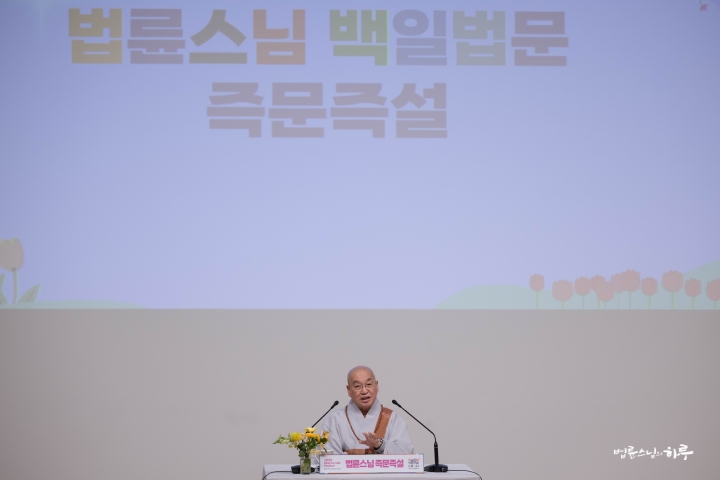
In the mid-1990s, I helped many people who were starving in North Korea. They might be grateful to me, but that doesn’t create a debt for them. This is because providing basic assistance to sustain life is simply what humans ought to do. For example, let’s say you borrowed 100 million won from a bank and lost everything when your business failed. If you have nothing left, it’s not a crime if you can’t repay the loan. However, private loans are a different matter. Bank loans have legally established procedures, so there’s no problem if you can’t repay due to lack of funds, but private loans are different. Private lenders demand repayment regardless of whether you have money or not. That’s why you should be careful about private loans when doing business. If you didn’t intend to avoid repayment from the beginning and simply cannot repay because you have no money, it’s not a sin.”
“I’m trying to understand my parents and think positively. But I’m worried that if I continue to stay in contact with them, new conflicts or wounds will eventually arise again.”
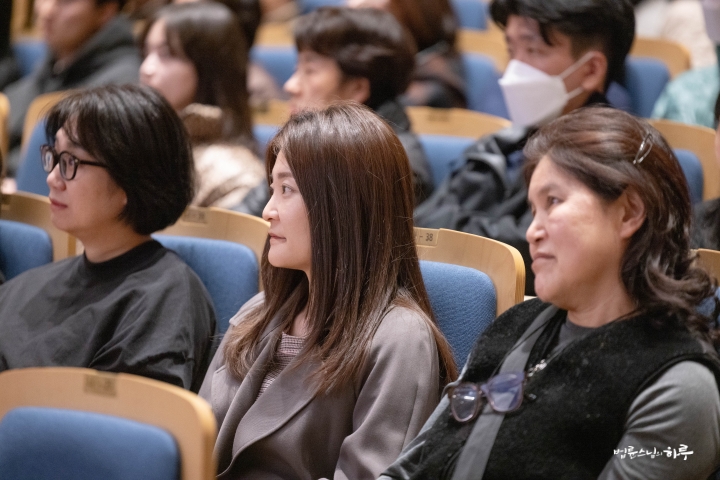
“Then don’t contact them. The choice is yours. Practice is ultimately about how you manage your emotions. Whether your parents contact you or get angry, that’s their issue. Not taking it emotionally is what practice is about. You can completely cut off contact, or keep it open but control it in the way you want. For example, when they contact you, you can say, ‘Okay, see you next time,’ and then not actually meet them. If they say they’re coming to see you, you can say, ‘I’m too busy.’ You can either block contact or keep it open but regulate it as you wish.
Ultimately, the choice is yours. If your immune system is weak, you need to live in a sterile room, but if your immune system is strong, you can live in various environments. Similarly, you can adjust family relationships according to your condition. When learning to drive, you first practice on quiet roads, but as your skills improve, you can drive on busy roads too. Family relationships are the same. If you can handle it, maintain the relationship; if not, keep your distance. After the age of 20, family relationships become social relationships. You don’t have to stay in contact just because they’re family, nor do you have to cut off contact just because they’re family. Maintain relationships that benefit you and end those that harm you. There’s absolutely no need to feel guilty.”
“I understand. I’ll train myself more and practice gradually. Thank you.”
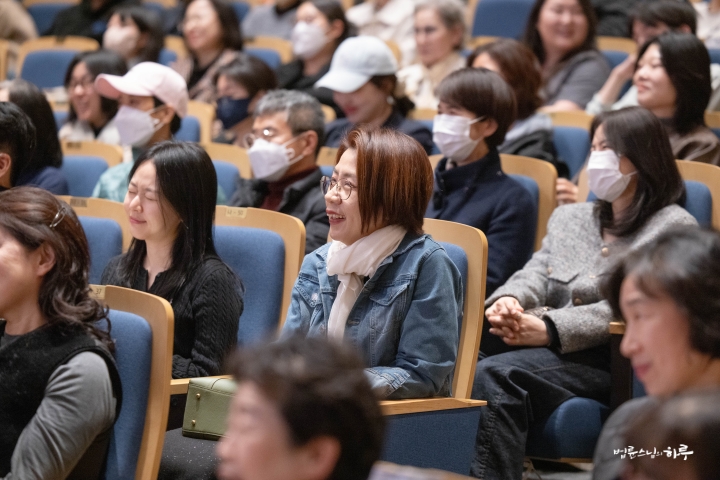
The questions continued.
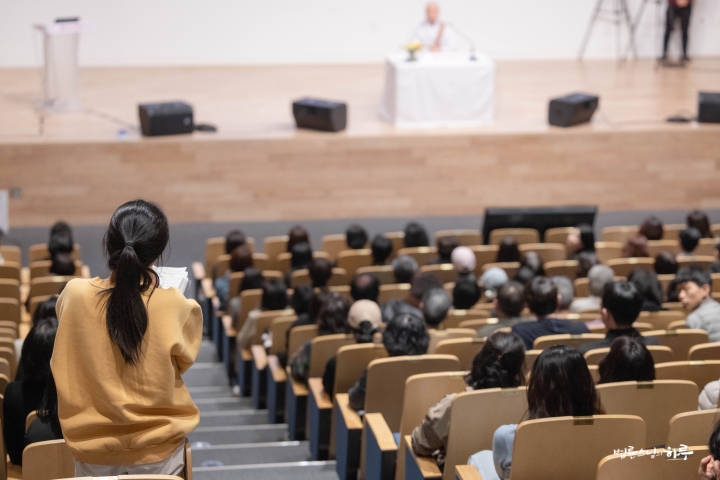
I’m concerned about your health. You’re getting older, and I wish you would take better care of your health.
I’m curious about how the soul interfaces with the autonomic nervous system. Can we say that the soul controls the body? Why does digestion stop when we experience shock?
I heard that your teacher once told you to live with a thousand-year perspective. What does that mean?
Until two years ago, I was so miserable that I wanted to die, but after attending the Jungto Dharma School and the Awakening Retreat, I now live each day with gratitude. What caused this improvement?
I’m 32 years old and still living with my parents. Is it okay to live with them until they pass away?
By the time the conversation ended, it was past 9 PM. Following the guidance of the volunteers, the audience gathered in the main hall dispersed to return home. Sunim expressed his gratitude to the volunteers for their hard work before heading to the Jungto Center.
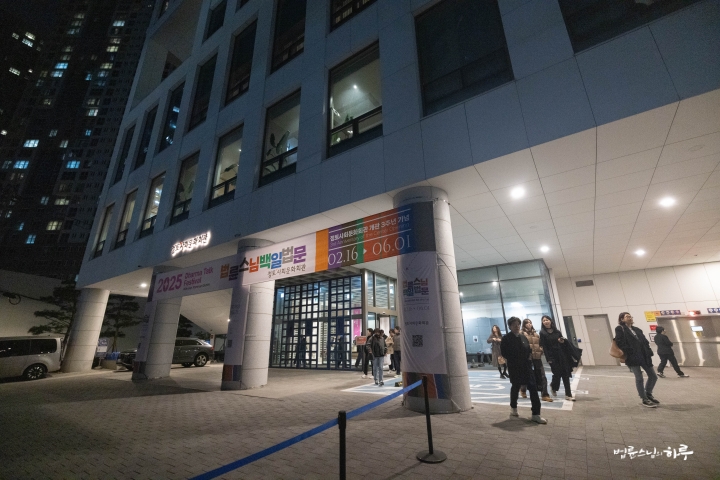
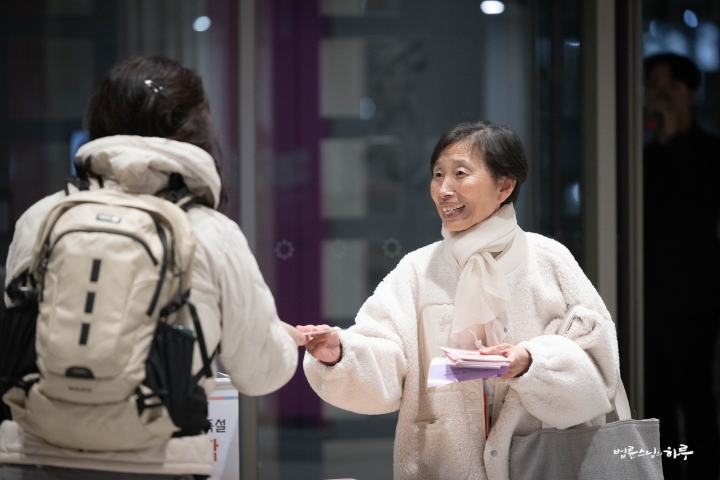
Tomorrow will be the 27th day of the 100-Day Dharma Talk. Sunim plans to be on a business trip for the next two days.




